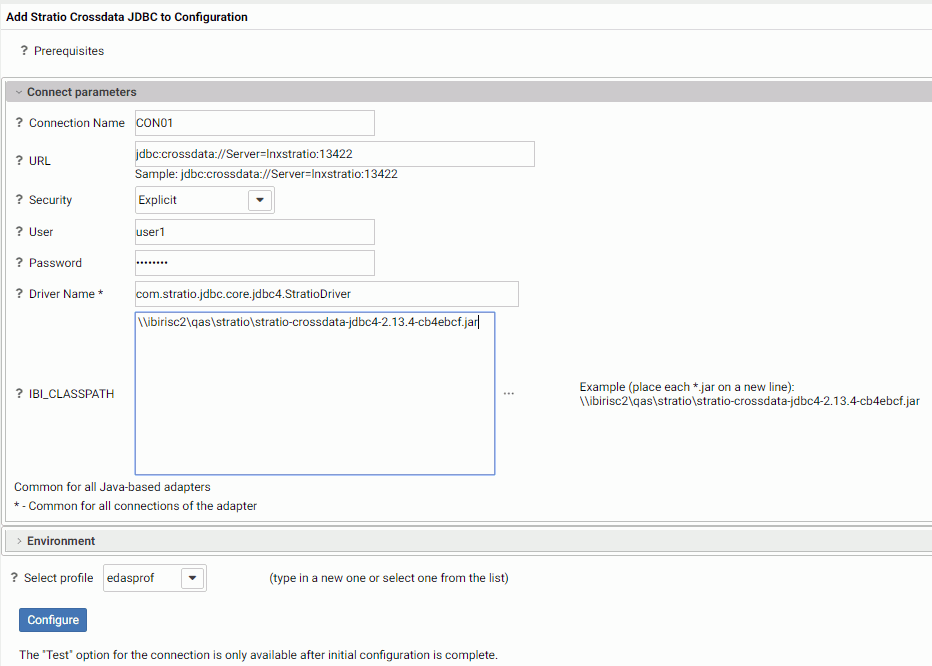Configuring the Adapter for Stratio Crossdata
|
Topics: |
|
How to: |
|
Reference: |
Configuring the adapter consists of specifying connection and authentication information for each of the connections you want to establish.
Procedure: How to Configure the Adapter for Stratio Crossdata
You can configure the adapter from either the Web Console or the Data Management Console.
- From the
Web Console sidebar, click Connect to Data.
or
From the Data Management Console, expand the Adapters folder.
In the DMC, the Adapters folder opens. In the Web Console, the Adapters page opens showing your configured adapters.
- In the Web Console, click the New Datasource button on the menu bar and find the adapter on the page or, in the DMC, expand the Available folder if it is not already expanded.On the Web Console, you can select a category of adapter from the drop-down list or use the search option (magnifying glass) to search for specific characters.
- In the DMC, expand the appropriate group folder and the specific adapter folder. The group folder is described in the connection attributes reference.
- Right-click Stratio Crossdata and click Configure JDBC.
- In the URL box, type the URL used to connect to your Crossdata server. For more information, see Hive/Impala Adapter Configuration Settings.
- In the Driver Name box, type the following driver name:
com.stratio.jdbc.core.jdbc4.StratioDriver
- Select the security type. If you are using Explicit,
type your user ID and password.
The following image shows an example of the configuration settings used:

- Select edasprof from the Select profile drop-down menu to add this connection for all users, or select a user profile.
- Click Configure.
- Click Test. You should see a list of data sources on your server.
Reference: Adapter for Stratio Crossdata Configuration Settings
The Adapter for Stratio Crossdata is under the SQL group folder.
- Connection name
-
Logical name used to identify this particular set of connection attributes. The default is CON01.
- URL
-
Is the URL to the location of the data source. For example:
jdbc:crossdata://Server=lnxstratio:13422;LogLevel=0;LogPath=.
where:
- server
-
Is the DNS name or IP address of the system where the Crossdata server is running. If it is on the same system, localhost can be used.
- default
-
Is the name of the default database to connect to.
- 13422
-
Is the default port number the Crossdata Server is listening on if not specified when the Crossdata server is started.
- Driver Name
-
Is the name of the JDBC driver, com.stratio.jdbc.core.jdbc4.StratioDriver.
- IBI_CLASSPATH
-
Defines the additional Java Class directories or full-path jar names which will be available for Java Services. This value may be set by editing the communications file or in the Web Console. Using the Web Console, you can enter one reference per line in the input field. When the file is saved, the entries are converted to a single string using colon (:) delimiters for all platforms. OpenVMS platforms must use UNIX-style conventions when setting values (for example, /mydisk/myhome/myclasses.jar, rather than mydisk:[myhome]myclasses.jar). When editing the file manually, you must maintain the colon delimiter.
- Security
-
There are two methods by which a user can be authenticated when connecting to a database server:
- Explicit. The user ID and password are explicitly specified for each connection and passed to the database, at connection time, for authentication.
- Password Passthru. The user ID and password received from the client application are passed to the database, at connection time, for authentication.
- User
-
Primary authorization ID by which you are known to the data source.
- Password
-
Password associated with the primary authorization ID.
- Select profile
-
Select a profile from the drop-down menu to indicate the level of profile in which to store the CONNECTION_ATTRIBUTES command. The global profile, edasprof.prf, is the default.
If you wish to create a new profile, either a user profile (user.prf) or a group profile if available on your platform (using the appropriate naming convention), choose New Profile from the drop-down menu and enter a name in the Profile Name field (the extension is added automatically).
Store the connection attributes in the server profile (edasprof).
Troubleshooting
If the server is unable to configure the connection, an error message is displayed. An example of the first line in the error message is shown below, where nnnn is the message number returned.
(FOC1400) SQLCODE IS -1 (HEX: FFFFFFFF) XOPEN: nnnn
Some common errors messages are:
[00000] JDBFOC>> connectx(): java.lang.UnsupportedClassVersionErr : or: org/stratio/crossdata/driver : Unsupported major.minor version 51.0
The adapter requires Java 1.8 or later and your JAVA_HOME points to Java 1.6.
(FOC1500) : ERROR: ncjInit failed. failed to connect to java server: JSS (FOC1500) : . JSCOM3 listener may be down - see edaprint.log for details
The server could not find Java. To see where it was looking, review the edaprint.log and set JAVA_HOME to the actual location. Finally, stop and restart your server.
(FOC1260) (-1) [00000] JDBFOC>> connectx(): java.lang.ClassNotFoundException: com.stratio.jdbc.core.jdbc4.StratioDriver (FOC1260) Check for correct JDBC driver name and environment variables. (FOC1260) JDBC driver name is com.stratio.jdbc.core.jdbc4.StratioDriver (FOC1263) THE CURRENT ENVIRONMENT VARIABLES FOR SUFFIX SQLCRD ARE : (FOC1260) IBI_CLASSPATH : ...
The JDBC driver name specified cannot be found in the jar files specified in IBI_CLASSPATH or CLASSPATH. The names of the jar files are either not specified, or if specified, do not exist in that location.
[08S0] Could not establish connection to jdbc:crossdata://Server=hostname:13422 : java.net.UnknownHostException: hostname
The server hostname could not be reached on the network. Check that the name is spelled correctly and that the system is running. Check that you can ping the server.
[08S01] Could not establish connection to localhost:13422/default: : java.net.ConnectException: Connection refused
The Stratio Crossdata server is not listening on the specified port. Start the server if it is not running, and check that the port number is correct.
| WebFOCUS | |
|
Feedback |